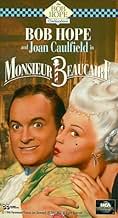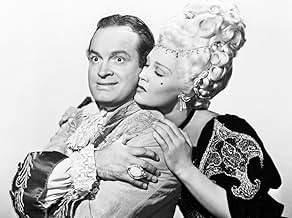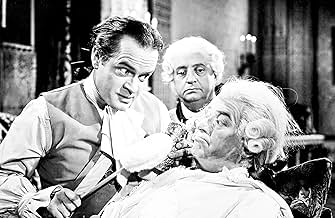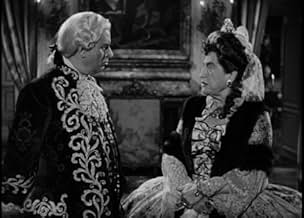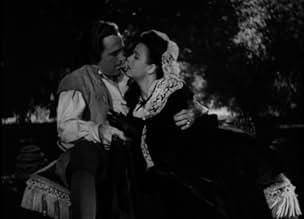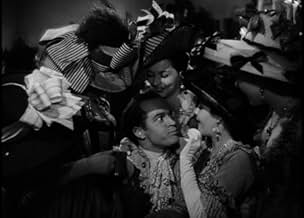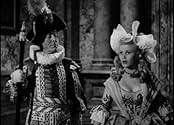A bumbling barber in the court of King Louis XV becomes engaged in political intrigue when he masquerades as a dashing nobleman engaged to the princess of Spain.A bumbling barber in the court of King Louis XV becomes engaged in political intrigue when he masquerades as a dashing nobleman engaged to the princess of Spain.A bumbling barber in the court of King Louis XV becomes engaged in political intrigue when he masquerades as a dashing nobleman engaged to the princess of Spain.
- Awards
- 1 win total
- Swordsman
- (uncredited)
- Women Who Gets Dress Ripped Off
- (uncredited)
- Court Jester
- (uncredited)
- Wife
- (uncredited)
Featured reviews
The film finds Bob playing a barber in the latter portion of Louis XV's reign (about 1770 more or less). Naturally Bob is a bit of a screw up and gets in trouble. But, there is a way out--he has to agree to pose as the Duke--a man who is to marry the Spanish princess and solidify an alliance between the countries. But, no one realizes that a crazy Spanish general (Joseph Schildkraut) has plans to kill the Duke, as he WANTS the countries at war with each other! So, it's up to the cowardly Hope to try to save his butt and, hopefully, find love. As for the Duke (Patric Knowles), he's fallen in love with a woman and doesn't really want to marry a princess he's never met. Can it all work out in the end and everyone live happily ever after?
The movie is relatively low on laughs--particularly the climactic sword-fighting scene (it's rather lame). But, Hope is an agreeable personality in the film and that makes up for the problems...which would include the3 fact that NONE of the French or Spanish people looked or talked like they came from these countries. Heck, Schildkraut was Austrian and sounded NOTHING like a Spaniard! And Hope seemed about as French as Nelson Mandella! Still, a nice and agreeable little film.
By the way, the original "Monsieur Beaucaire" was a silent film starring Rudolph Valentino and was not a comedy. Also, although this is only of interest to history teachers, the film talked about the guillotine several times, though it was not used for the first time until about 1791--during the French Revolution.
In 1946 Hope was between 44 and 42 years old, so physically he still looked reasonably presentable as a man (when properly made up with make-up) who is in his 30s. That helps considerably. Compare this film to it's Technicolor counterpart in the middle 1950s, CASANOVA'S BIG NIGHT. In that film the plot is very similar, but the middle aged man, with the middle aged spread is not believable as even a comic substitute for the great lover. He is just plausible in BEAUCAIRE. He also demonstrates his timing is sharper, and he even demonstrates (possibly accidentally, but one wonders) a gift for mimicry. At one point he is speaking when behind a mask as though he is Owen, and he momentarily does capture something of the speech pattern and bluster of the English actor.
As pure escapism the film is more than adequate. As history it is questionable. Schildkraut is a type of Spanish Napoleon, wanting to overthrow the royal family in a war between Spain and France. Hence the need for the royal marriage that involves Knowles and Reynolds. But the military in Spain in the 18th Century produced no such figure as Don Fernando (it is hard to believe the screen writers Norman Panama and Melvin Frank were thinking of a later adventurer and court favorite Count Godoy). Owen is quite good at being Louis (he had played the role a decade earlier in the George Arliss film VOLTAIRE). The year is never giver - actually it is quite vague, but 1765 seems the most probable year: At one point Collier and Owen are reminiscing about their wedding. Queen Marie (the daughter of the King of Poland) married Louis in 1725, and Owen mentions they've been married 40 years). The Queen died in 1768, and Louis died in 1774. The problem is that the Spanish King is Philip II in the cast. King Philip II of Spain ruled from 1555 - 1598. The King of Spain in 1765 was Carlos III (notable for a number of reforms, and being reluctantly drawn into policies by the French). You see, the Bourbon Family had begun ruling Spain in 1714, at the end of the War of the Spanish Succession, when King Louis XIV's second oldest son became King Philip V of Spain (the Philip they screenwriters were probably thinking of). But the so-called "Family Compact" united the foreign policies of Spain and France for most of the 18th Century. So the threat of a war between the two countries never really existed in history at this time.
There are many nice touches in the film: Hope's attempt at suicide (with an unknotted hangman's noose) that is almost pushed to completion by his friend Leonid Kinski; Hope's mimicry of Owen (mentioned above); the climactic duel between Hope and Schildkraut, in which both men get entangled with a harp and a cello. Caulfield and Knowles both get a chance to sing. And Hope even (with Schildkraut's assistance) gets a passing shot (literally) at his rival/friend from the "Road" Pictures. It remains an entertaining spoof, and one of Hope's best comedies.
Everyone does a great job of it, including Hillary Brooke as Madame Pompadour, Constance Collier as the Queen of France and Cecil Kellaway as Count D'Armand.
Watch and have fun!
Did you know
- TriviaOne of over 700 Paramount Productions, filmed between 1929 and 1949, which were sold to MCA/Universal in 1958 for television distribution, and have been owned and controlled by Universal ever since. Its initial television broadcast took place in Seattle Saturday 29 November 1958 on KIRO (Channel 7); it first aired in Boston Wednesday 4 February 1959 on WBZ (Channel 4) and in Minneapolis Sunday 8 February 1959 on WTCN (Channel 11), and as it slowly spread across the USA, it was not long before it became a popular local favorite. In Milwaukee it first aired Sunday 12 April 1959 on WITI (Channel 6), in Denver 18 May 1959 on KBTV (Channel 9), in St. Louis 23 May 1959 on KMOX (Channel 4), in Chicago 10 October 1959 on WBBM (Channel 2), in Phoenix 28 November on KVAR (Channel 12), in Philadelphia 5 December 1959 on WCAU (Channel 10), in San Francisco 27 December 1959 on KPIX (Channel 5), in Pittsburgh 14 January 1960 on KDKA (Channel 2), in Des Moines 27 January 1960 on WHO (Channel 13), in Wichita 29 January 1960 on KTVH (Channel 12), and in Toledo 15 February 1960 on WTOL (Channel 11). It was released on DVD 8 October 2002 in tandem with A vos ordres ma générale (1947) as part of Universal's Bob Hope: The Tribute Collection, and again as a single 30 October 2015 as part of the Universal Vault Series.
- GoofsReferences are made to the guillotine as a means of execution. The guillotine was not invented until the reign of King Louis XVI.
- Quotes
Mimi: Oh, you're so right. One look is enough.
Monsieur Beaucaire: That regal forehead runs in the family.
Mimi: The Hapsburg chin!
Monsieur Beaucaire: Got that from my mother.
Mimi: The Bourbon nose!
Monsieur Beaucaire: Got that from my father, drank like a fish!
Mimi: Those dark, flashing eyes - that soft lustrous hair!
Monsieur Beaucaire: You should see it after a rinse!
- ConnectionsFeatured in Bob Hope at 100 (2003)
- How long is Monsieur Beaucaire?Powered by Alexa
Details
- Runtime1 hour 33 minutes
- Color
- Aspect ratio
- 1.37 : 1
Contribute to this page


